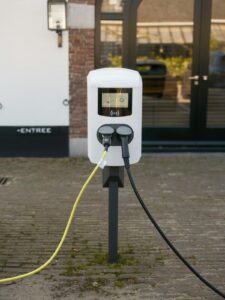
Home / EV Charging News / The Importance of Data in Electric Car Charging
The increasing adoption of electric vehicles (EVs) is contributing to the transition to a more sustainable future. However, one of the most significant challenges in the adoption of EVs is the lack of a robust charging infrastructure. The efficient charging of EVs is critical for reducing range anxiety, enhancing customer satisfaction, and encouraging more significant numbers of people to make the switch to EVs. In this article, we will explore how data analytics can help to optimize electric car charging and build a more efficient charging infrastructure.
To optimize electric car charging, it is crucial to collect data on various parameters that influence the charging process. The data collected can be categorized into three main types, namely, operational data, vehicle data, and environmental data. Operational data includes information on the location of charging stations, the availability of charging stations, and the cost of charging. Vehicle data includes data on the battery capacity, charging rate, and charging state of the EV. Environmental data includes weather conditions, temperature, and humidity.
The sources of data collection in electric car charging can be both internal and external. Internal data sources include the charging station itself, charging station management systems, and customer information. External data sources include weather APIs, traffic data, and public charging data.
Despite the abundance of data sources in electric car charging, data collection can be challenging due to issues such as data quality, compatibility, and data privacy concerns.
Data analytics can help to optimize electric car charging in several ways. Machine learning algorithms can be used to optimize charging station placement and to predict charging demand. Predictive modeling can be used to determine charging patterns and peak charging times. Real-time data analysis can be used to identify charging station malfunctions, optimize charging rates, and improve customer experience.
Optimizing electric car charging through data analytics can bring several benefits, including:
Despite the benefits of data analytics in electric car charging, there are also several challenges in implementing data analytics solutions. These challenges include:
Data analytics can help to optimize electric car charging and build a more efficient charging infrastructure, promoting the widespread adoption of electric vehicles. By collecting and analyzing data, charging providers can improve charging efficiency, reduce charging time, and enhance customer satisfaction. However, implementing data analytics solutions in electric car charging comes with challenges that must be addressed, including data privacy concerns, lack of standardization, and high costs. Despite these challenges, the benefits of data analytics in electric car charging are significant, and the future potential for data analytics in the
$2,890.00 Original price was: $2,890.00.$2,790.00Current price is: $2,790.00.
$3,950.00 Original price was: $3,950.00.$3,450.00Current price is: $3,450.00.
$1,650.00 Original price was: $1,650.00.$1,590.00Current price is: $1,590.00.
$2,290.00 Original price was: $2,290.00.$2,150.00Current price is: $2,150.00.
$1,290.00 Original price was: $1,290.00.$799.00Current price is: $799.00.

Your Power Management Partner for Over 25 Years Future Generations Depend on Our Decisions Today ™
2024 © All rights reserved by CyberSwitching